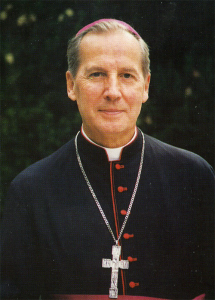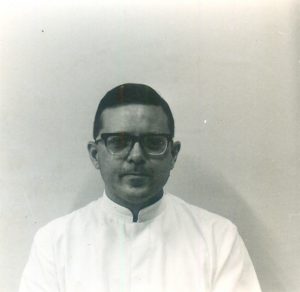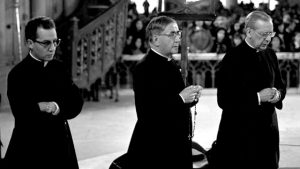(An interview with Fr. Joseph de Torre on the occasion of Bishop Javier Echevarría’s visit to the University of Asia and the Pacific on August 12, 1998. This article first appeared in the 1998 Special Issue of Universitas. Banner photo by Kaboompics .com from Pexels)
Q: What are your fondest memories of Bishop Javier Echevarría?
A: I first met Javier Echevarría in November 1951, when I met to Rome to join the second batch of the Roman College of the Holy Cross, an international study center our Founder (Blessed Josemaría Escrivá [now Saint]) established. I met him in a train station in Rome where he and a friend came to fetch my companion and me. The four of us went to Villa Tevere, the headquarters of Opus Dei in Rome. Javier Echevarría was already in his masteral program in canon law and civil law. He joined the first year group of the Roman College in SY 1950-1951. I joined the second year group but I was able to advance into the masteral program immediately, so we finished our doctorate at the same time in 1953. For three years we were living together. In those three years I got to know him very well, and we became very close to each other. I learned that he was from Madrid. I am also from Madrid. We were born in the same place, almost at the same time. I am just three weeks older than him.

In 1953, Blessed Josemaría and Fr. Alvaro del Portillo [now Blessed], the vicar general and rector of the Roman College, asked four of us who had finished the doctorate if we were willing to become priests. We accepted. But then our Founder told each one of us that we had to wait because we were too young. The minimum age to be ordained is 24 or, in some cases, 23. We were only 21. So he told us to stay in Rome and work for the Roman College as secretaries. This was another chance to work closer with Javier Echevarría, because he was made the coordinating secretary and was in charge of distributing tasks to us.
We turned 23 in 1955, so the four of us, together with 32 more, were ordained on 7 August 1955. After the ordination, Javier and three or four more went back to Rome to work there with the Founder, this time as priests. I was sent to Ireland and stayed there until 1968.
During my stay in Ireland, I would sometimes go to England where I had the chance to see Javier again. Summers in Europe are very hot, except in England where the summer is very mild. This was the reason why the Founder spent his summers working in England from 1958 to 1962. He always came with Javier.
I met Javier again in 1968 when I was asked to go to the Philippines. On my way to Manila, I passed by Rome. That was the last time I saw our Founder because he died in 1975. I saw Javier again when Fr. Alvaro del Portillo visited Manila in 1987, and when our Founder was beatified in 1992.

In 1995, he asked me to spend some months in Rome to take a rest from the tropics and from the pressure of work. I was surprised that he remembered many things that I had already forgotten, details about people, for instance, who were there then, and our classmates. It was amazing.
Q: Describe him as a friend, as a priest, as a person.
A: He was an extremely pious person; he still is. He has a good sense of humor. He is very relaxed, very jovial, at the same time very serious with his work. Javier is also a very apostolic person.
Q: What do you think did the Founder see in Bishop Echevarría?
A: Our Founder always taught us that we should have a sense of continuity. We shouldn’t do things in a way that no one could take our place. He said it was necessary to groom someone to be his successor. So that’s what he did. First, Alvaro del Portillo, who was so close to him, and then Javier Echevarría. I was convinced that he (the Founder) was grooming (Echevarría). So count the years, from 1950, when he was studying in Rome, to the death of the founder in 1975, that’s 25 years of working closely with our Founder. Then, from 1975 to 1994, he spent 19 years with Alvaro del Portillo. That’s why he’s unique. No one has been as close with both the Founder and his successor as he has.

Q: What words of his inspired you most?
A: He didn’t tell me anything special. What he told me applies to all: Christian responsibility, helping society, having a social conscience. He emphasized very much the social teaching of the church. It should always be there in all the courses everyone takes in the University. Social teaching is brought into these courses because everybody who graduates here must have a social conscience. To help society and to serve others, you must have a high level of intellectual development and professional competence.
Q: Has the Father changed?
A: Not at all. Well, he has changed for the best, for the better. He’s basically the same person I met in 1951. He has great simplicity, sincerity, and good humor. He absorbed so much from our Founder and his successor, that he truly reflects the spirit of our Founder and of Fr. Alvaro.#
Fr. Joseph de Torre was a University Professor at UA&P. He died on May 31, 2018. His old-time friend Bishop Javier Echevarría, the second prelate of Opus Dei, passed away on December 12, 2016.
Leave a Reply